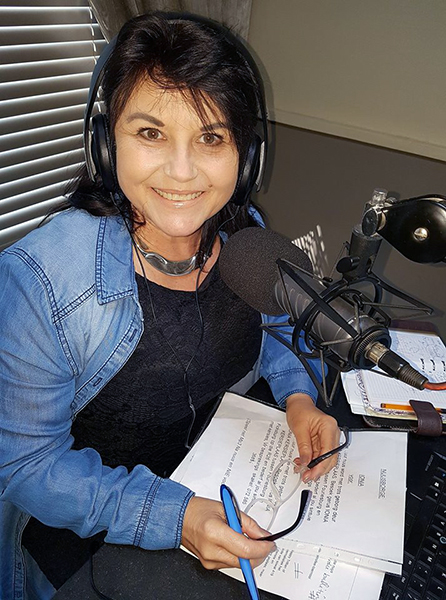Latest News Archive
Please select Category, Year, and then Month to display items
13 January 2020
|
Story Eugene Seegers
|
Photo Anja Aucamp
 Spearheading the digital expansion of the conversational Sesotho course is IDEAS Lab Director, Johann Möller (middle). With him are from the left: Prof Pule Phindane, CUT; Dr Brenton Fredericks, CUT; Bahedile Letlala, UFS Department of African Languages; and Dr Elias Malete, UFS Department of African Languages.
Spearheading the digital expansion of the conversational Sesotho course is IDEAS Lab Director, Johann Möller (middle). With him are from the left: Prof Pule Phindane, CUT; Dr Brenton Fredericks, CUT; Bahedile Letlala, UFS Department of African Languages; and Dr Elias Malete, UFS Department of African Languages.
For many years now, the UFS has been offering a one-year course in conversational Sesotho for staff members; this can then be followed up with the one-year course in advanced conversational Sesotho. The conversational Sesotho for students in the Faculty of Education was introduced in 2018 at the UFS.
The Central University of Technology (CUT) needed a conversational course for its first-year students and approached the Department of African Languages for the development of such a course. Living as we do in a multilingual country; this additional language skill opens doors and often hearts as well.
Using instructional design principles
However, the need was identified by both CUT and UFS to present this crucial information in a way that would be more appealing to digital natives as well as to those less familiar with technology. The Department of African Languages on the UFS Bloemfontein Campus, together with relevant departments from the CUT, approached the IDEAS Lab located on the UFS South Campus, since they already have a reputation for being a specialist on broadcasting and repackaging curricular content for digital presentations. The IDEAS Lab provided technical advice and built the multimedia programme, which will help the user to hear and practice phrases in Sesotho, using instructional design principles. The course will be available to both staff and students belonging to the two universities.
Room for growth
Johann Möller, Director of the IDEAS Lab, says this pilot programme will give both institutions the opportunity to test the use of multimedia for language acquisition. He adds, “Language is extremely complex, and we would like to expand this learning aid in the future.” In fact, the original design has room for growth built into it.
To keep things simple for the user and the building team, it was decided to start out with only four potential everyday scenarios where a staff member would like to speak Sesotho: Firstly, how to greet other persons from different genders; secondly, potential scenarios one might encounter in the university environment itself; thirdly, how to deal with situations at a hospital; and finally, how to use one’s language skills at a filling station.
Pronunciation is key
Each scenario contains three to four conversations that the learner can revise, along with images and audio that illustrate the situation and assist with correct pronunciation. The system does not allow the user to progress unless they have listened to the pronunciations of the sample sentences or phrases.
Further reading material and vocabulary lists are also provided, with the result that people who are using the programme can learn at their own pace. The authoring software Articulate Storyline was used to build the individual scenarios and each conversation or lesson within it. The lessons are also not dependent on an internet connection; they can be downloaded onto a flash memory drive and used offline.
Academic volunteers time on community radio
2017-12-25

Dr Marian Human-Nel
Photo: Supplied
Superior Scholarship. Human Embrace. Institutional Distinctiveness. Emergent Leadership. Public Service.
These are the core values underpinning both the university’s academic and human projects. It is the last one, public service, that resonates well with Dr Marian Human-Nel. She does her part as a radio presenter and news reader on Maluti FM 97.1, a Bethlehem-based community radio.
“As a community radio station, we are not only responsible for entertaining and informing the public, but we also do a lot of community fundraising projects. We also do a lot of wellbeing activities in the Eastern Free State,” said Dr Human-Nel, Subject Head and Lecturer in the Department of Afrikaans, Dutch, German and French on the Qwaqwa Campus.
Sharing of information and knowledge
Dr Human-Nel volunteers her services as presenter of two programmes. “I present Kollig in which I invite my Qwaqwa Campus colleagues and professionals in the community to talk about their specific fields of interest and research. The focus here is on information and sharing knowledge. We have a slot called ‘This Week in History’ written and prepared by my colleague from the History department.”
Another show that Dr Human-Nel presents is called Fluit-Fluit Storietyd on which she reads and does voice performance of Afrikaans short stories and poems with specific music. “The Fluit-Fluit programme informs and entertains through cultural activities,” she said.
Maluti FM broadcasts over a 160-kilometre radius around Bethlehem and is also available online.